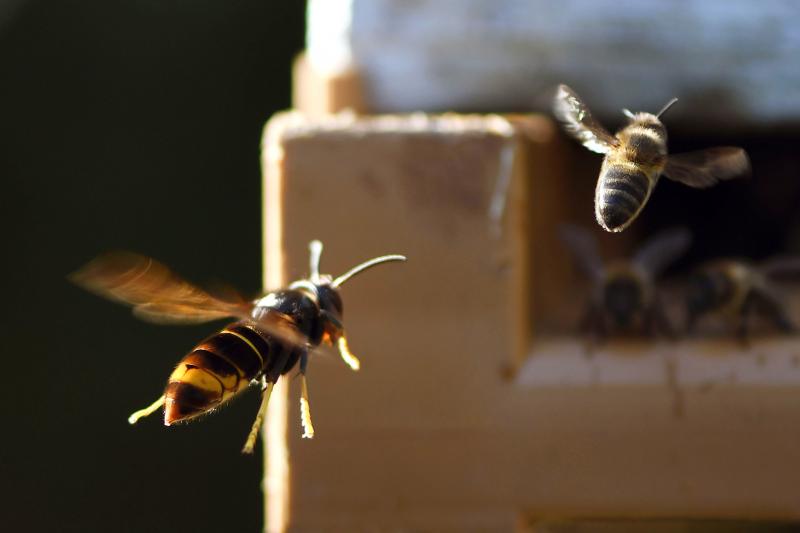It is certainly one way to defend a home: Scientists have observed that Asian honeybees collect chicken feces, buffalo dung and even human urine, then smear it around the entrances of their nests to stop attacks from marauding giant hornets.
The pungent practice is the first documented case of honeybees collecting non-plant matter, and the first clear example that they can use a “tool” — in this case, excrement.
A team led by Heather Mattila at Wellesley College published a study on the phenomenon in the journal PLOS ONE on Wednesday.

Photo: AFP
“We’re adding another, rather complicated defense that Asian honeybees have to an already impressive list of defenses they have to prevent these hornets from destroying their colonies,” she said.
It was previously known that honeybees, famous for their prolific collection of resources, have devised an array of strategies to deflect attacks from predators.
These include physically shielding their colonies, performing synchronized body shakes or wave-like displays, or enveloping intruders in a ball until they overheat.
Giant hornets, which are four to five times bigger than honeybees, are well-armored killing machines with a venomous sting, and powerful mandibles for crushing, dismembering and chewing prey.
A scout hornet can find a honeybee nest, chemically mark it, and then recruit up to 50 of its own nestmates for a wholesale slaughter — killing thousands of their targets before occupying their home.
In the new study, Mattila and her colleagues observed three apiaries in Vietnam, where one beekeeper had informed them that the strange spots seen on honeybee nests came from water buffalo dung.
“We thought that’d be crazy, because bees don’t collect dung,” Mattila said.
The team confirmed that the honeybees were indeed collecting dung and other excrement, which they applied around their nest entrances in response to visits by giant hornets, but not in response to visits from smaller, less threatening hornet species.
They also found that colonies that were exposed to secretions from glands that giant hornets use to mark nests for attack had more fecal spots around their nest entrance after six hours than colonies exposed to a control substance.
Hornets were less likely to land on nest entrances with large numbers of fecal spots and they spent 94 percent less time chewing at the entrance if they did land.
The authors wrote that the animal feces may contain compounds that deter the hornets. Or, it might be masking the chemical markers the hornets put down to target colonies for mass attacks.
“The use of animal feces by Asian honeybees showcases the impressive suite of weapons they have evolved to defend their colonies against one of their most dangerous predators,” they said.

PARLIAMENT CHAOS: Police forcibly removed Brazilian Deputy Glauber Braga after he called the legislation part of a ‘coup offensive’ and occupied the speaker’s chair Brazil’s lower house of Congress early yesterday approved a bill that could slash former Brazilian president Jair Bolsonaro’s prison sentence for plotting a coup, after efforts by a lawmaker to disrupt the proceedings sparked chaos in parliament. Bolsonaro has been serving a 27-year term since last month after his conviction for a scheme to stop Brazilian President Luiz Inacio Lula da Silva from taking office after the 2022 election. Lawmakers had been discussing a bill that would significantly reduce sentences for several crimes, including attempting a coup d’etat — opening up the prospect that Bolsonaro, 70, could have his sentence cut to

China yesterday held a low-key memorial ceremony for the 1937 Nanjing Massacre, with Chinese President Xi Jinping (習近平) not attending, despite a diplomatic crisis between Beijing and Tokyo over Taiwan. Beijing has raged at Tokyo since Japanese Prime Minister Sanae Takaichi last month said that a hypothetical Chinese attack on Taiwan could trigger a military response from Japan. China and Japan have long sparred over their painful history. China consistently reminds its people of the 1937 Nanjing Massacre, in which it says Japanese troops killed 300,000 people in what was then its capital. A post-World War II Allied tribunal put the death toll

A passerby could hear the cacophony from miles away in the Argentine capital, the unmistakable sound of 2,397 dogs barking — and breaking the unofficial world record for the largest-ever gathering of golden retrievers. Excitement pulsed through Bosques de Palermo, a sprawling park in Buenos Aires, as golden retriever-owners from all over Argentina transformed the park’s grassy expanse into a sea of bright yellow fur. Dog owners of all ages, their clothes covered in dog hair and stained with slobber, plopped down on picnic blankets with their beloved goldens to take in the surreal sight of so many other, exceptionally similar-looking ones.

‘UNWAVERING ALLIANCE’: The US Department of State said that China’s actions during military drills with Russia were not conducive to regional peace and stability The US on Tuesday criticized China over alleged radar deployments against Japanese military aircraft during a training exercise last week, while Tokyo and Seoul yesterday scrambled jets after Chinese and Russian military aircraft conducted joint patrols near the two countries. The incidents came after Japanese Prime Minister Sanae Takaichi triggered a dispute with Beijing last month with her remarks on how Tokyo might react to a hypothetical Chinese attack on Taiwan. “China’s actions are not conducive to regional peace and stability,” a US Department of State spokesperson said late on Tuesday, referring to the radar incident. “The US-Japan alliance is stronger and more